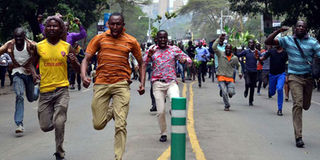Tension over presidential poll rerun causing economic slump

Nasa supporters run along City Hall Way, Nairobi, joyfully after the Supreme Court nullified the re-election of President Uhuru Kenyatta of Jubilee, on September 1, 2017. A repeat poll will take place on October. PHOTO | FRANCIS NDERITU | NATION MEDIA GROUP
What you need to know:
- In ethnically divided Kenya, you take a position on a public issue depending on the hegemonic interests of your tribe.
- Without a quick resolution to the presidential election issue, our economy will remain badly exposed.
Agents of change. Makers of history. The accolades for Chief Justice David Magara and the other Supreme Court judges who recently annulled the presidential election have been flowing — fast and furious — from across the world.
In an editorial, the New York Times described the ruling as “a critical first for Kenya and Africa demonstrating that democratic institutions are capable of acting independently and resolving disputes that have in the past spilled into violence”.
The Financial Times of London however described the decision as a blow for democracy and the rule of law that should resonate across the country’s borders.
INTELLIGENCE
I made sure I was in front of the television throughout the proceedings. And the drama was just riveting.
We all burst out laughing when lawyer Paul Muite implied that, like human beings, computer servers go to sleep at night.
A colleague wondered how M-Pesa services have all along been available throughout, though their servers were, until recently, located in Europe.
As I observed and followed Maraga’s interjections and questions to counsel, the CJ impressed by his grasp of essentials and rare capacity to go for the jugular of every issue that came up.
JUDICIARY
The manner in which he would snappily put an end to hair-splitting arguments and glaring breaches of procedure by counsel also impressed me.
The CJ is a man who does not suffer fools gladly.
The day the court proclaimed the declaration to annul the elections, it was clear that Kenya was at a point of national introspection.
The Judiciary, the wise men say, is the soul of a democracy.
But the public discussion that followed went according to script.
WANGARI MAATHAI
As a society, we have become so polarised that we are unable to come to terms with historic and momentous changes happening under our very own noses.
We trivialise everything, behaving as if we are incapable of seeing the big picture around the events even the rest of the world is proclaiming as a solid democratic achievement for the country.
It reminded me of the way we treated Prof Wangari Maathai when she won the Nobel Peace Prize in 2004.
The country erupted into a mundane public debate, suggesting that what the late Prof Maathai deserved — after winning the Nobel — was a Cabinet position.
POLARISED
In ethnically divided Kenya, you take a position on a public issue depending on the hegemonic interests of your tribe.
There is no middle ground. We do not have popular moderates.
Indeed, public reactions to the Supreme Court decision also served to show how low the standards of public debate in Kenya have sunk.
Sometimes I get the feeling that the reason the standards of political debate have sunk so low is the disproportionate space we accord to lawyers.
In this society, every lawyer with a view gets the space to say it.
I can’t remember a television talk show that didn’t have a lawyer on the panel.
PUBLIC DEBATES
But as we all know, lawyers are trained to argue in circles and think in absolutes.
That is why attitudes of tolerance, bargaining and compromise, which democracy needs to thrive, continue to elude us.
We are not self-critical enough to face the truth.
These days, when our religious leaders issue public statements, the distinct impression you get is that these are people who lost their sense of national outrage a long time ago.
When they came out this week to respond to utterances by political elites to the historic court judgment, all their statements and utterances exhibited what is often described as the ‘both sides’ phenomenon.
PARTISANSHIP
Instead of talking straight and coming out strongly to condemn what is wrong in society, statements issued by the clergy strive to make sure both sides of the political divide are apportioned blame and irresponsibility.
You will see them twisting like tornadoes to make sure that they spread blame equally.
They have to guard against being accused of partisanship — even if it means ending up fudging the truth.
Without a quick resolution to the presidential election issue, our economy will remain badly exposed.
ECONOMY
Our economy is close to exhausting its main sources of resilience — namely, investment by the private sector, very few profitable companies and a dearth of opportunities for profitable investments.
If you are in doubt, look at statistics and trends on the uptake of credit by the private sector, consumption of electricity, the take-up of mortgages, bank profitability, the tribulations of Nakumatt and Uchumi.
We must go back to reinvigorating growth in the real economy.





